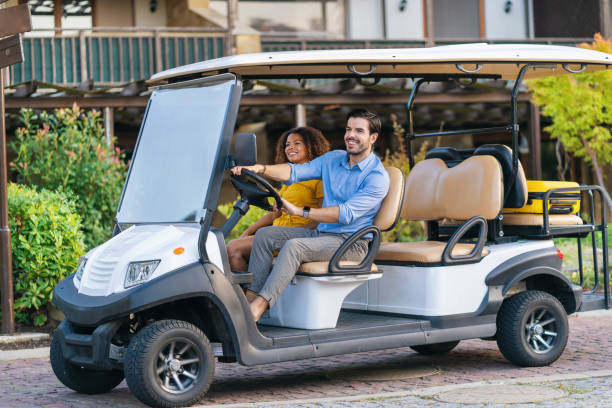When searching for the perfect vehicle to navigate large estates, resorts, or recreational areas, turning to a golf cart dealer is a practical and popular solution. These electric rides offer convenience, efficiency, and a touch of luxury, whether you're overseeing property operations or providing guests with a smooth transportation experience. However, choosing the right model involves more than just picking the flashiest option on the lot.
In this guide, we’ll help you make an informed decision on selecting the best electric cart for your specific needs, covering everything from power specifications to design features.
Understanding Your Needs
Before visiting a golf cart dealer, it’s important to assess the environment where the cart will be used. Are you operating on a hilly terrain or flat surface? Will the cart be used primarily for transportation or utility purposes? Understanding your specific requirements will help narrow down the options.
- Terrain Type: For uneven or hilly landscapes, a more powerful motor and higher torque are crucial.
- Passenger Capacity: Consider how many people will typically ride the cart. Models range from 2-seaters to 8-passenger configurations.
- Usage Frequency: Daily use requires a model with longer battery life and higher durability.
Types of Electric Golf Carts
Golf carts come in various types, each designed for different applications:
- Standard Passenger Carts: Ideal for general transportation.
- Utility Carts: Equipped with cargo beds and towing capabilities.
- Luxury Carts: Feature-rich options with upgraded seating, lighting, and entertainment systems.
Talk to your golf cart dealer about what’s available and what models best fit your property's needs.
Battery Life and Charging
One of the most critical components of an electric ride is the battery. Depending on your operational hours, you may need a cart that offers an extended range per charge.
- Lithium vs. Lead-Acid Batteries: Lithium batteries are lighter, charge faster, and last longer but come with a higher upfront cost.
- Charging Infrastructure: Ensure your property can support the necessary charging stations and has access to reliable power.
- Battery Maintenance: Some batteries require regular maintenance; others are maintenance-free.
Safety and Compliance
Many regions require specific safety standards for electric carts, especially if they're used on public roads.
- Lights and Signals: Ensure the cart has headlights, brake lights, and turn signals.
- Seat Belts and Mirrors: These are essential for user safety.
- Compliance: Work with your golf cart dealer to ensure the model meets local regulations.
Customization Options
One of the benefits of working with a reputable dealer is the ability to customize your cart. From branding with your resort logo to adding weather enclosures or specialized seating, customization enhances both functionality and aesthetics.
- Color and Branding: Match your property’s theme or color scheme.
- Accessories: Add items like coolers, GPS systems, or upgraded tires.
- Seating Arrangements: Choose from rear-facing seats, bench seats, or individual captain’s chairs.
Environmental Considerations
Electric golf carts offer a greener alternative to gas-powered vehicles. They produce no emissions and have a lower environmental impact. When choosing a model:
- Energy Efficiency: Look for carts with regenerative braking systems.
- Recyclability: Some manufacturers offer recyclable parts or take-back programs.
- Noise Levels: Electric carts are quieter, making them ideal for resorts focused on guest tranquility.
Working with a Golf Cart Dealer
Selecting the right golf cart dealer is just as important as choosing the cart itself. Look for a dealer that:
- Offers a Wide Range of Models: Variety ensures you can find the perfect fit.
- Provides Excellent After-Sales Support: Maintenance, repair services, and warranties are crucial.
- Has Experience in Commercial Use Cases: Dealers who understand resort or property needs can offer better recommendations.
Cost and Financing
While electric carts are an investment, they often pay off in efficiency and guest satisfaction. When budgeting:
- Upfront Costs vs. Long-Term Savings: Consider energy costs, maintenance, and potential tax incentives.
- Financing Options: Many dealers offer leasing or financing plans.
- Resale Value: Some brands retain value better than others, making them a smarter long-term purchase.
Maintenance Tips
Keeping your cart in top condition ensures longevity and performance:
- Regular Inspections: Check tires, brakes, and battery status frequently.
- Scheduled Maintenance: Follow the dealer’s guidelines for service intervals.
- Cleanliness: Regular cleaning prevents wear and tear, especially in coastal or dusty environments.
Conclusion
Choosing the right electric cart starts with partnering with a knowledgeable golf cart dealer. By understanding your property’s needs, evaluating your options carefully, and considering key factors like battery life, safety, and customization, you’ll make a smart, lasting investment that enhances both functionality and guest experience.
When you’re ready to explore your options, consult a trusted golf cart dealer who can guide you every step of the way—from selection to maintenance—ensuring you get the best value and performance out of your new electric ride.





Comments